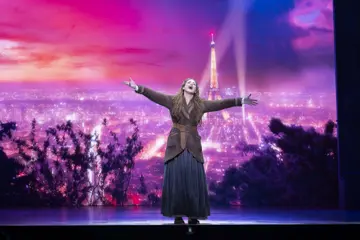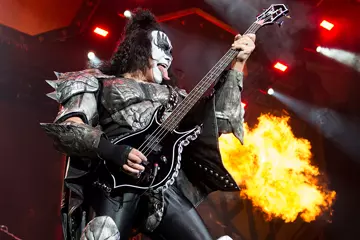 Seth Green
Seth Green“We've got a good case to say that C3PO is gay, but I don't know if there's as strong a case for R2,” says Seth Green. “I feel like R2 was more the begrudging suitor, sort of politely resisting the unwanted advances of his partner.”
When you're talking to Green, it's no surprise that the conversation turns to Star Wars. The 39-year-old veteran of screens big and small grew up as both a child actor and a self-professed Star Wars nerd. Years later, as one of the key creative forces behind the anarchic stop-motion sketch-comedy cacophony, Robot Chicken, Green got to air out that nerdery for all to see. The series has mounted three separate Star Wars specials steeped in Lucasfilm lore and geeky in-jokery, with Green serving as writer, director and producer thereof.
“I've loved Star Wars for as long as I can remember,” beams Green. “As an adult, now, I love it for being non-idealised science-fiction. It takes place in a future in which people have clothes as opposed to metallic jumpsuits. The ships they're piloting aren't these gleaming beacons paying testament to human ingenuity and success, they're these beaters and junkers, falling apart because the people who pilot them can't afford it. So, even though it's a very fantastic universe, it feels very relatable.
“But the thing I most remember from watching it the first time, when the movie came out, when I was a little kid, was C3PO and R2D2. There was something about the colour, and the shine, and the robots, and the purpose they served in the story; that's always stuck with me, always remained for me. It's served me throughout my life as a great point of inspiration.”
Don't miss a beat with our FREE daily newsletter
Shooting the shit with Green, whether about gay robots or not, is a pleasure; there's a reason he's long had a reputation as one of the nice guys of the biz. That holds with fans — be they of Robot Chicken, Austin Powers, Family Guy, Greg The Bunny or Buffy; those shows headlining a career filled with intersections to cult institutions — who view Green with a friendliness and an affection.
“I'm not all that threatening. I'm not a big dude. I'm not so handsome that their girl's going to leave them. I'm not gonna beat them in arm-wrestling. I'm glad that I can be non-threatening to so many of [my] fans. I'm not Brad Pitt. Nobody wants my underwear or to rifle through my garbage. To be honest, the thing most fans seem to want from me is to get high with them. People want me to come hang out at their house and eat pizza whilst we watch TV whilst we're stoned. I get the most basic, non-elaborate friend requests.”
As well as his most famous roles – if we have to create a hierarchy: his turn as Scott Evil in the Austin Powers movies and his grating voice-role as Chris Griffin in Family Guy would be at the top – Green has a long and vaguely unbelievable CV rolling out behind him. He was in The Wonder Years and Pump Up The Volume, two landmarks of my own childhood. He was in Can't Buy Me Love and Can't Hardly Wait, two similarly-named films that stand as sublimely middle-of-the-road landmarks in the teen comedy uprisings of the '80s and the '90s. As a kid he was in Stephen King's It and Tales From The Darkside; as an adult he played himself, mockingly, on Entourage and hosted a WWE Raw.
“I've worked a lot,” is all Green can say, with a self-deprecating laugh, when you take a tour through the craziness of his IMDB page (Mr. Belvedere! The Facts Of Life! The X-Files! The OG Beverly Hills, 90210!). “I've been really lucky, and I've worked really hard, and I've always just tried to pick things that seemed interesting or fun. I've never just been 'that guy' from just the one thing. People have a lot of different points of access for me.”

Green cites persistence, hard work, good luck and other generic-sounding-but-undoubtedly-sincere reasons for his career longevity. But he also credits variety: looking to engage with various forms of work and, when presented with a lull, the ingenuity to create your own. That was part of the impetus for Robot Chicken, which began life as a 'second job' for its principle creators – Matthew Senreich, Douglas Goldstein, Tom Root – that had no imminent career payoffs. It was a cult born with very little ambition: first it was a two-minute short film. After some investment cash came in, it became 12 two-minute short films for the nascent frontier of internet content – “it was pre-broadband, so no one actually got to watch what we were doing” – and, then, after four years of shopping the shorts as a 'pilot', eventually landed on Adult Swim.
“Because it came from such small beginnings, we've never anticipated it was going to go anywhere. That's why we end every season with us getting cancelled, because we will never assume that this thing is actually going to keep going.”
Yet, when the show became an unexpected success in its first season, in 2005 – “we got a million viewers, which no one could understand; it didn't even seem possible” – suddenly the Robot Chicken dudes “had to think what [they] actually wanted to say.”
Which is? “Well, we don't have any mandates. We're not out to poison children's minds in any discernible way. We've always just worked to the goal of making things that are funny, that we all like, that make us all laugh, and every once in a while we'll throw in some subversive social commentary. Even though, obviously, we're not South Park in that regard. We think of it more as being akin to the same way that Monty Python was both incredibly silly and culturally informed.”
Local Robot Chicken nerds will get to come face-to-face with the show's creative crew when they trip down to Australia to present a live 'show' as part of the Graphic Comic and Visual Art Festival soon taking over the Sydney Opera House. “It'll be a bit of a unique program, especially compared to some of the more elaborate presentations they've had at the Opera House,” Green says. “We're thinking of it as an intimate conversation with our fans, much more than a big stage show.”
And though Green insists that usually fans are “polite and respectful and reasonable” — and maybe just want to get stoned and watch trashy TV with him — there sometimes are those who are a little more 'out-there'. “It really depends on the fan,” he laughs. “Usually it's warm-and-fuzzy; but when people are a little more wild and aggressive and unruly, then it can go to dark places.
“People give me a lot of home-made stuff. But, most of the time, I can usually appreciate where that sentiment is coming from, because I like art-makers. They'll give me things they've made, that they've painted, that they've sculpted, that they've customised, that they've sewn. I never see it as creepy, I always see it as sweet; I can see how many hours they've put into this thing.”
These days, staring at 40, with 30 years of work behind him, Green's relaxed enough to take it all as it comes. “When I was in my early-twenties, I used to go to concerts and if I saw someone who wasn't dressed like me, I'd be offended. 'How dare they show up dressed like that? They haven't earned being here, I saw this band play years ago back in Berkeley, these people aren't real fans!' And, eventually, I just came to adopt a different philosophy, which is more like, 'Wow, here's this person who I would've thought I would have nothing in common, but here's this one thing that we both share, that we both like'. I started looking at it from that perspective; instead of trying to emphasise the differences, I started trying to highlight the similarities. It's great that we're all involved in this ongoing conversation, but some people find these ideas a little later. If someone's only just watched something I did years ago, that's great. I try and choose projects that are interesting to me, and I'm glad they can be interesting to people years later. If you can have a conversation with your hairdresser about Party Monster ten years after it came out, that's actually just awesome.”















